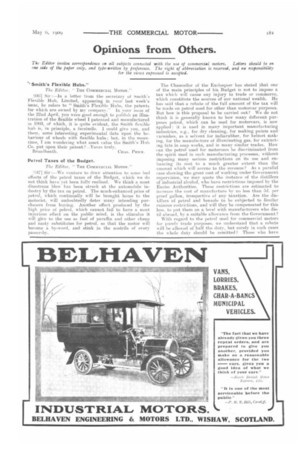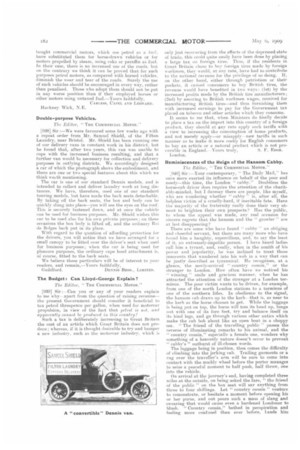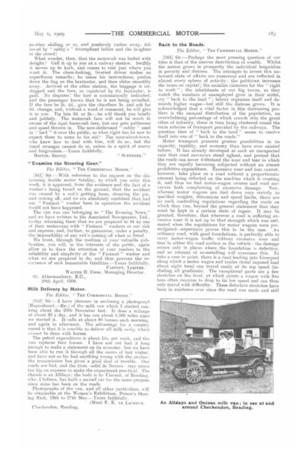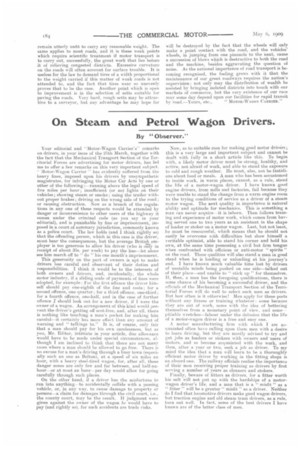Opinions from Others.
Page 17

Page 18

Page 19

Page 20

If you've noticed an error in this article please click here to report it so we can fix it.
The Editor invites correspondenee on all subjects connected with the use of commercial motors. Letters should be on
one side of the paper only, and tyPe-toritten by preference. The right of abbreviation is reserved, and no responsibility for the views expressed is accepted.
" Smith's Flexible Hubs."
nit: Editor, TIIE COMMERCIAL MOTOR."
ti.2431 Sir :—In a letter from the secretary of Smith's Flexible Hub, Limited, appearing in your last week's issue, he refers to " Smith's Flexible Hillis, the patents for which are owned by my company." In your issue of the 22nd April, you were good enough to publish an illustration of the flexible wheel I patented and manufactured in 1903, of which, it is quite evident, the Smith flexible hub is, in principle, a facsimile. I could give you, and them, some interesting experimental data upon the be haviour of wheels with flexible hubs ; but, in the meantime, I am wondering what asset value the Smith's Hub Co. put upon their patent ?—Yours truly, Broad heath. CoAs. PRICE.
Petrol Taxes of the Budget.
The Editor, ".THE Comm nliCIAL MOTOR."
)..37] Sir :—We venture to draw attention to some bad effects of the petrol taxes of the Budget, which we do not think have yet been fully realised. We think a most disastrous blow has been struck at the automobile industry by the tax on petrol. The much-enhanced price of petrol, which continually will be brought home to the motorist, will undoubtedly deter many intending pin:chasers from buying. Another effect produced by the high price of petrol, which cannot fail to have a most injurious effect on the public mind, is the stimulus it will give to the use as fuel of paraffin and other cheap and nasty substitutes for petrol, so that the motor will become a by-word, and stink in the nostrils of every passer-by. The Chancellor of the Exchequer has stated that one of the main principles of his Budget is not to impose a tax which will cause any injury to trade or commerce, which constitute the sources of our national wealth. He has said that a rebate of the full amount of the tax will be made on petrol used for other than motorcar purposes. But how is this proposal to be carried out? We do not think it is generally known to how many different purposes petrol, which can be used for motorcars, is now applied : it is used in many important manufacturing industries, e.g., for dry cleaning, for making paints an • varnishes, as a solvent for indiarubber, for helmet making, for the manufacture of illuminating gas, for extracting fats in soap works, and in many similar trades. How can the petrol used for motorcars be discriminated from the spirit used in such manufacturing processes, without imposing many serious restrictions on its use and enhancing its cost to a much greater extent than the MOROt which will accrue to the revenue? As a parallel ease showing the great cost of working under Government supervision, we may quote the instance of the distillers of industrial alcohol, who have restrictions imposed by the Excise Authorities. These restrictions are estimated to increase the cost of manufacture by no less than 5d. per proof gallon, irrespective of any taxation. Are the distillers of petrol and benzole to be subjected to Aimilar ruinous restrictions, and will they be compensated for this loss, to pnt them on a level with manufacturers who distil abroad, by a suitable allowance from the Government ? With regard to the petrol used for commercial motors for purely trade purposes, we understand that a rebate will be allowed of half the. duty, but sorely in such eases the whole duty should be remitted? Those who have bought commercial motors, which use petrol as a ftwl, have substituted them for horse-drawn vehicles or for motors propelled by steam, using coke or paraffin as fuel. In their case, there is no increased use oi the roads; but on the contrary we think it can be proved that for such purposes petrol motors, as compared with horsed vehicles, diminish the wear and tear of the roads, Surely the use of such vehicles should be encouraged in every way, rather than penalised. Those who adopt them should not be put in any worse position than if they employed horses or other motors using untaxed fuel.—Yours faithfully,
CARLESS, CAPEL AND LEONARD.
Hackney Wick, N.E.
Double-purpose Vehicle s.
The Editor, " THE COMMERCIAL MOTOR."
[938] Sir ;—We were favoured some few weeks ago with a repeat order from Mr. Samuel Shield, of the Fitton Laundry, near Bristol. Mr. Shield has been running one of our delivery vans in constant work in his district, but he found that, after two years, this van was unable to cope with the increased business resulting, and that a further van would be necessary for collection and delivery purposes in outlying districts. We accordingly designed a car of which the photograph shows the embodiment, and there are one or two special features about this which we think worth mentioning.
The car is one of our standard Dennis models, and is intended to collect and deliver laundry work at long dis tances. We have, therefore, used one of our standard touring models, but have made the hack seats detachable. By taking off the hack seats, the box and body can be quickly slung into place—you will see the eyes on the roof.
This is securely fastened down, and at once the vehicle can he used for business purposes. Mr. Shield wishes this
car to be used also for his own private purposes; on these occasions the box body is lifted off, and the ordinary Rol is Bilges back put in its place.
With regard to the question of affording protection for the drivers, you will notice that we have arranged for a small canopy to be fitted over the driver's seat when used for business purposes; when the ear is being used for pleasure purposes, the ordinary cape hood attachment is, of course, fitted to the back seats.
We believe these particulars will he of interest to your readers, and remain,—Yours faithfully,
Guildford. DENNIS BROS.; LIMITED.
The Budget Can Lloyd-George Explain ?
The :Editor, " THE COMMERCIAL MOTOR."
[939] Sir :—Can you or any of your readers explain to me why— apart from the question of raising revenue— the present Government should consider it beneficial to tax petrol threepence per gallon, when used for motorcar propulsion, in view of the fact that petrol is no?, and apparently cannot, be produced -in this country? Such a tax is deliberately increasing to Great Britain the cost of an article which Great Britain does not produce ; whereas, if it is thought desirable to try and hamper a new industry, such as the motorcar industry, which is
only just recoveritig from the effects of the depressed state of trade, this could quite easily have been done by placing a large tax on foreign tires. Thus, if the residents in Great Britain chose to buy foreign tires ma.de by foreign workmen, they would; at any rate, have had to contribute to the national revenue for the privilege of so doing. If, on the other hand, either through patriotism or their pockets; it caused consumers to buy British tires, the revenue would have benefited in two ways: (1st) by the increased profits made by the British tire manufacturers; (2nd) by assuring to British workmen wages, received for manufacturing British tires—and thus furnishing them with increased earnings to pay for the Government tax placed on tobacco and other articles which they consume.
It seems to me that, when Ministers do finally decide to place a tax on the import into this country of a foreign product they should at any rate apply such tariffs with a view to increasing the consumption of home products, and not merely apply—or misapply—new tariffs in such manner as to make it more costly for English consumers to buy an article or a natural product which is not procurable in England.-Visors truly, S. F. EDGE. London.
Reminiscences of the Reign of the Hansom Cabby.
The Editor, "THE COMMERCIAL MOTOR."
L9411] Sir :—Your contemporary, The Daily Mail," has once more exerted its influence on behalf of the poor and needy—this time, the London " cabby." Doubtless the horse-cab driver does require the attention of the charitably-minded; but I daresay there are people, like myself, who are wondering whether " cabby " is, after all, the helpless victim of a cruelly-hard, if inevitable fate. Have the majority of the fraternity really done their very utmost to brighten their own prospects? Has the public, to whom the appeal was made, any real occasion for sincere regrets that the hansom and the " growler " are at last disappearing There are some who have found " cabby an obliging and cheerful servant, but there are many more who have found !Lim a haughty, supercilious, and, to say the least of it., an extremely-impolite person. I have heard ladies call him a tyrant, and, really, when in the zenith of his power and popularity, he was inclined to treat those innocents that wandered into his web in a way that can he justly described as tyrannical. He recognises, at a glance, the newly-arrived " country cousin," or the stranger to London. How often have we noticed his " winning " smile and gracious manner, when he has attracted the attention of the stranger at a London terminus. The poor victim wants to be driven, for example, from one of the north London stations to a terminus of one of the southern lides. In obedience to the signal, the hansom cab draws up to the kerb—that is, as near to the kerh as the horse chooses to get. While the luggage is being putt on top, the horse will toss its head up, lunge out with one of its fore feet, try and balance itself on its hind legs, and go through various other antics which make the cab bob about like an open boat in a choppy sea. " The friend of the travelling public " passes the reverse of illuminating remarks to his animal, and the " country cousin," especially a female one, wonders why something of a heavenly nature doesn't occur to prevent " cabby's " outburst of ill-chosen words. The luggage being in position, then comes the difficulty of climbing into the jerking cab. Trailing garments or a rug over the traveller's arm will be sure to come into contact with the muddy wheel before the porter manages to seize a peaceful moment to half push, half throw, one into the vehicle.
On arrival at the journey's end, having completed three miles at the outside, on being asked the fare, " the friend of the public " on the box seat will say anything from three to four shillings. Let " country cousin" venture to remonstrate, or hesitate a moment before opening his or her purse, and out pours such a mass of slang and swearing that would cause even a hardened Londoner to blush. " Country cousin," bathed in perspiration and feeling more confused than ever before, Lands him another shilling or so, and positively rushes away, followed by " cabby's " triumphant bellow and the laughter of the crowd!
What wonder, then, that the motoreah was hailed with delight? Call it up to you at a railway station. Swiftly it moves up to kerb, and comes to rest just where you want it. The clean-looking, liveried driver makes no superfluous remarks; he takes his instructions, pushes down the flag on the taximeter, and then slides smoothly away. Arrived at the other station, the baggage is unshipped and the fare, as registered by the taximeter, is paid. No disputes the fare is automatically indicated, and the passenger knows that he is not being swindled. If the fare be 2s. 4d., give the chauffeur 3s. and ask for 6d. change, and, without a word of comment, he will give it to you. Tip him 2d. or 2s.—he will thank you briefly and politely. The motorca.b fare will not be much in excess of the legal horse-cab fare, but one gets politeness and speed thrown in. The now-dethroned " cabby '' used to " lord " it over the public, so what right has he now to expect them to come to his aid? The man-about-town, who knew how to deal with him, will do so; but the timid stranger cannot do so, unless in a spirit of mercy and forgiveness.—Yours faithfully, Merton, Surrey. '6 SUFFERER."
"Examine the Steering Gear."' The Editor, "THE COMMERCIAL MOTOR."
:941] Sir :—With reference to the inquest on the distressing double motor fatality, to which you refer this week, it is apparent, from the evidence and the fact of a washer's being found on the ground, that the accident was caused by a nut's getting loose, shearing the pin, and coming off, and we are absolutely confident that had our " Fastnut " washer been in operation the accident would not have happened. The van was one belonging to " The Evening News," and we have written to the Associated Newspapers, Ltd., so-day informing them that we are prepared to fit up one of their motorvans with " Fastnut " washers at our risk and expense, and, further, to guarantee, under a penalty, the impossibility of any nut's coming off when so fitted.
We trust, through the medium of your valuable publication, you will, in the interests of the publie, again allow us to draw the attention of your readers to the reliability and simplicity of the " Fastnut " washer and what we are prepared to do, and thus prevent the recerrenee of such lamentable fatalities.—Yours faithfully, FARTN17T, LIMITED.
WALTER R. COOK, Managing Director.
60. Aldermanbury, E.C.,
29th April, 1909.
Milk Delivery by Motor.
The Editor, " THE COMMERCIAL MOTOR."
1942] Sir :—I have pleasure in enclosing a photograph [Reproduced.—Eisi of the milk van which I started running about the 20th December last. It does a mileage of about 30 a day, and it has run about 5,000 miles since we started it. It calls at about 80 houses each morning, and again in afternoon. The advantage for a country round is that it is possible to deliver all milk early, which cannot be done with horses.
The petrol expenditure is about 14s. per week, and the van replaces four horses. I have not yet had it long enough to make a statement on its economy, but we have heeu ahle to run it through all the snows of last winter. and have not so far had anything wrong with the eneine ; the transmission has given a good deal of trouble. Our roads are bad, and the tires—solid de Neversmay prove too big an expense to make the experiment practical. The chassis is an Alldays; the body is by Vincent, of Reading. who, I believe, has built a second car for the same purpose since mine has been on the roads.
Photographs of the van, and all other particulars, will be obtainable at the Women's Exhibition. Prince's Skating flunk. 13th to 27th May.—Yours faithfully.
(Miss) E. K. LE LACHFXR. Cheekendon, Reading.
Back to the Roads.
The Editor, THE COMMERCIAL MOTOR."
[943] Sir :—Perhaps the most pressing question of our time is that of the uneven distribution of wealth. Whilst the nation grows in prosperity the individual languishes in poverty and distress. The attempts to arrest this untoward state of affairs are numerous and are reflected in almost every sphere of activity: the politician increases the taxes on capital; the socialist clamours for the " right to work " ; the inhabitants of our big towns, as they watch the numbers of unemployed grow in their midst, cry " back to the land " ; labour organises itself and demands higher wages—but still the distress grows. It is acknowledged that a vital factor in this distressing problem is the unequal distribution of the population, an overwhelming percentage of which crowds into the great cities of industry, these in turn being clustered round the main arteries of transport provided by the railways. The question then of " back to the land " seems to resolve itself into one of " back to the roads."
Motor transport presents greater possibilities in its capacity, rapidity, and economy than have ever existed before. It has already developed at such an unexpected rate that road surveyors stand aghast, and protest that the roads can never withstand the wear and tear to which they are rapidly becoming subjected without an almost prohibitive expenditure. Excessive wear and tear cannot, however, take place on a road without a proportionate amount being reflected on the machine which is creating it, and thus we find motor-wagon owners and road surveyors both complaining of excessive damage. Now, whereas motor wagons are tied down very strictly to specified weights, dimensions and speed limits, there are no such controlling regulations regarding the roads on which they run, beyond the general statement that they must be kept in a certain state of repair. It may be granted, therefore, that wherever a road is suffering excessive wear it is not up to that strength which was estimated when the regulations for motor wagons were promulgated—experience proves this to be the case. An ordinary road, with good foundations, is perfectly able to carry motor-wagon traffic without excessive wear and tear to either the road surface or the vehicle the damage occurs only in places where the foundation is defective, and no amount of re-metalling will overcome this. To take a case in point, there is a road leading into Liverpool along which a motor wagon and trailer (total imposed load about eight tons) can travel easily at its top speed (including all gradients). The exceptional parts are a few stretches on the level, at which points a wagon with five tons often requires to drop to its low speed and can then only travel with difficulty. These defective stretches have been in existence ever since the road was made and still remain utterly unfit to carry any reasonable weight. The same applies to most roads, and it is these weak points which require scientific treatment if motor transport is to carry out, successfully, the great work that lies before it of relieving congested districts. Excessive curvature on the roads will often account for surface trouble. It is useless for the law to demand tires of a width proportional to the weight carried if this matter of weak roads is not attended to, and the fact that tires wear so unevenly proves that to be the ease. Another point which is ()pee to improvement is in the selection of setts suitable for paving the roads. Very hard, rough setts may be attractive to a surveyor, but any advantage he may hope for will he destroyed by the fact that the wheels will only make a point contact with the road, and the vehicles' wheels, in jumping from one pinnacle to the next, cause a succession of blows which is destructive to both the road and the machine, besides aggravating the question of noise. As the national importance of road transport is becoming recognised, the feeling grows with it that the maintenance of our great roadways requires the nation's supervision: not only may the distribution of wealth be assisted by bringing isolated districts into touch with our markets of commerce, but the very existence of our race may some day depend upon our facilities for rapid transit by road.—Yours, etc., " MOTOR-WAUON CARRIER."






















